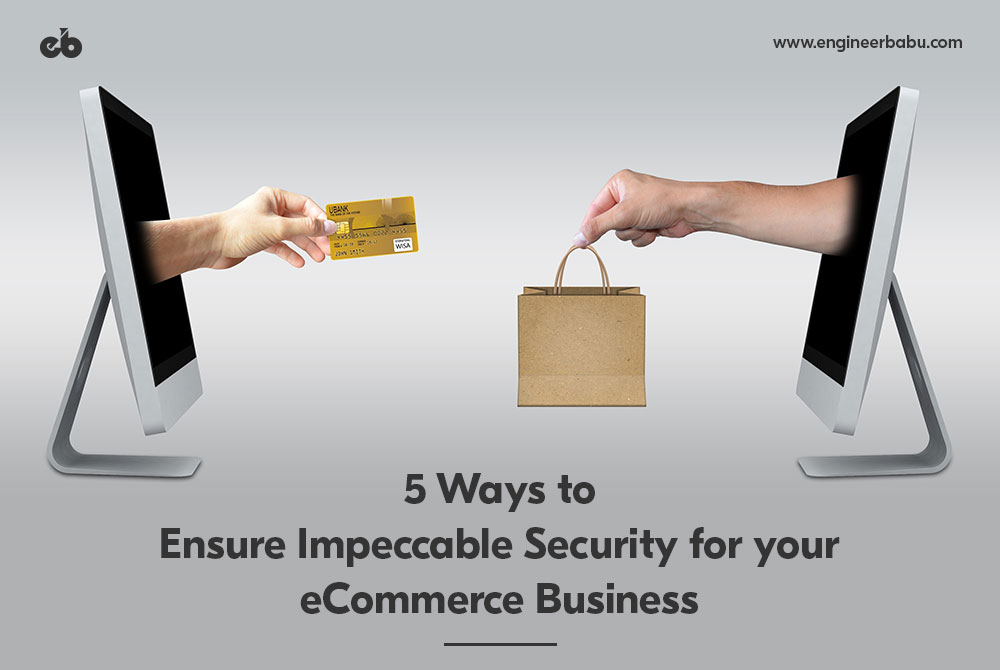eCommerce has been flourishing for a decade now. The yearly growth this domain has witnessed is staggering to even put in words. However, commerce over the internet involves its ambiguities.
Since its nascent stage, the ecommerce domain has been marred with security contingencies.
eCommerce security involves a set of protocols that safely guide eCommerce transactions.
Regardless of scale, all types of eCommerce websites are victims of security contingencies. What makes eCommerce such an appealing target for cybercriminals is the volume and sensitivity of the data they deal with. Millions of customers share their banking information, personal details, and other critical data when they register to use.
Even giants like Target and eBay have fallen prey to these attacks. So, what should you do differently to ensure impeccable security for your ecommerce website or business when even tech biggies are struggling with it?
In this article, we’ll discuss in length – 5 Security Measures for Your eCommerce Website/Business.
Firstly, let us understand some of the most distinguished and common threats that hamper merchants from doing business effectively –
- Online Security
There is a wide range of ecommerce security threats out there that hamper trade over the internet. The primary motive behind all these security threats is to exploit the victim in terms of money. These include credit card frauds, malware, phishing attacks, hacking, spams, etc. - System Reliability
System reliability comprises three major types of issues- The Internet service provider (ISP) server could crash
- The online payment system could show errors
- The ecommerce plugin could have bugs
- Privacy Issues
We can’t even quantify how many product catalogs, user IDs, personal information, and financial information like credit card details a typical eCommerce site stores. That’s what makes eCommerce sites of almost any magnitude, so attractive and appealing to hackers and fraudsters to exploit. A customers’ personal data could be compromised and used for spamming, identity theft and unsolicited marketing. Therefore, privacy issues are one of the most pressing problems for e-commerce businesses. - Payment Frauds
No matter how good your online security measures are, sometimes it is tough to avoid payment frauds. Notorious elements could get access to details of your credit cards by impersonating as financial institutions. - Intellectual Property Issues
Others could copy your product descriptions, product images, copyright logos, even music, and even videos and use it for their purposes. Intellectual property violations are pretty eminent as they could easily be made.
Recommended Read: How to Start an eCommerce Business?
Having learned about the major threats, now let’s dig into how you can prevent your site or your business from these imminent anomalies that hover around this realm,
1. Get SSL Certified
Ideally, every site needs to have SSL by default. Generally, SSL certificates are used to protect data transfer, credit card transactions, and login information. In a recent development, SSL certifications are also being deployed on social media sites to enable secure browsing.
What are SSL certificates?
SSL Certificates are records of data which digitally bind a cryptographic key to an organization’s details. When deployed on a server, SSL activates the padlock and HTTPS protocol and activates secure connections from a web server to a browser.
SSL Certificates bind together:
- A domain name, server name or hostname.
- An organizational identity (i.e., company name) and location.
The primary reason why the utilization of SSL is increasing is that they keep sensitive information sent across the Internet encrypted so that only the intended recipient can access it. This is critical because the information one sends over the Internet is conceded from computer to the other to get to its destination. If any computer in the network is compromised, the server would be able to see your username, passwords and even sensitive information like credit card numbers if it is not encrypted with an SSL certificate.
When an SSL certificate is used, the information becomes unreadable to everyone except for the server you are transferring the information to. This approach safeguards it from potential threats and notorious elements.
How does it work?
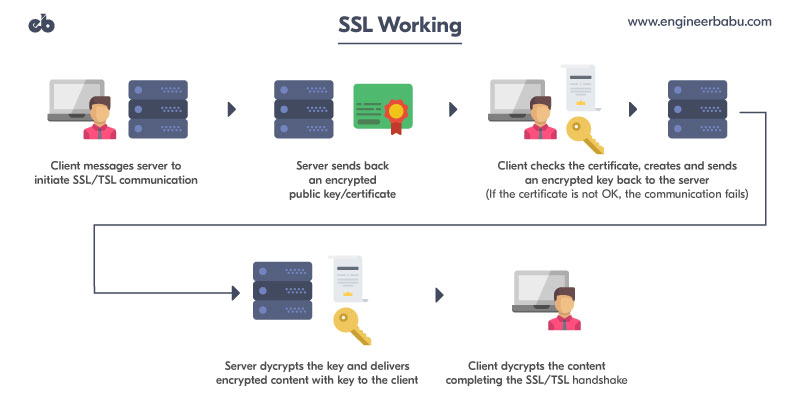
- A user attempts to connect to a website (i.e., a web server) via a web browser. This connection needs to be secured with SSL.
- The web browser requests the identity of the web server.
- The web server sends a copy of its SSL certificate.
- The browser verifies the received SSL certificate. If verified it sends a message to the web server.
- The web server acknowledges by sending over an acknowledgment.
- The session is started, and encrypted data is shared
2. Become PCI compliant
In a study, it was found that nearly 90% of security breaches impact small businesses.
PCI Compliance stands for Payment Card Industry Data Security Standard (PCI DSS). The PCI DSS is a security standard for organizations that handle branded credit cards from the major card schemes.
The standard came into practice in 2006 and has gained wide popularity worldwide to prevent credit card frauds and to increase controls around cardholder data.
PCI compliance applies to corporations of any size that accepts card payment. So, is your ecommerce PCI compliant?
There are plenty of reasons to become PCI compliant as this could increasingly secure your online transactions considerably.
Small businesses often feel plagued in their capabilities to adjust their processes accordingly to become PCI compliant. Hence, if you want your business to become PCI compliant you need to remember, PCI compliance is attained through a collaborative effort amongst teams, including working with payment processors that ensure PCI compliance, accepting EMV chip cards and even securing your business’s IT infrastructure, networks, and payment processes.
PCI compliance can be intimidating and complicated for e-commerce business owners to decipher and implement, but they’re a set of precautions designed to minimize your risk and protect your customers.
Getting PCI compliant can be a daunting task, especially for small business owners. Thus your PCI compliance checklist should include the following:
- Use a firewall for payment card data and public network, and keep the firewall updated.
- Do not store the cardholder’s data. If your business needs to store cardholders’ data, make sure you use strong encryption. Several platforms provide extensions to shift the storage of cardholder data. For instance, you can deploy Magento’s extension BrainTree to switch the storage of the cardholder data.
- Use encryption to safeguard all transmissions of cardholder data over any public network.
- You need to ensure that your card processing systems have a vendor-supplied security patch installed.
- Limit access to cardholder data to as few people as possible.
- Regularly test your security systems and network environment.
- Establish an effective and efficient security policy and make sure that all personnel are aware of it.
3. Choose the correct eCommerce Platform
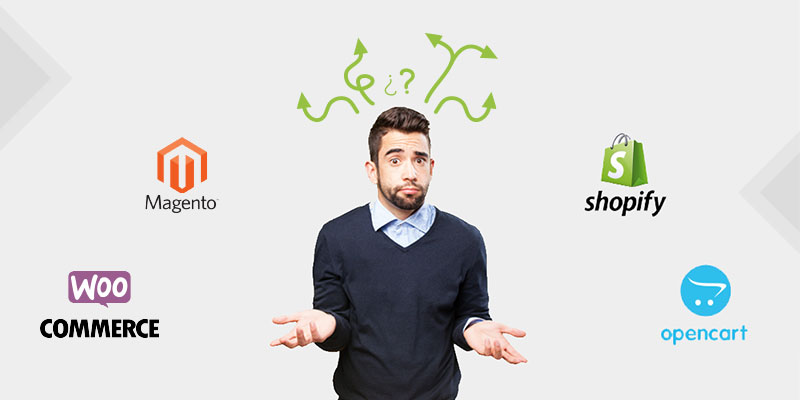
It is an extremely critical business process to employ an efficient ecommerce platform for your business. It is vital, especially for small business, to be extremely vigilant while selecting the correct ecommerce platform for your business.
With sleuths of ecommerce platforms being available at throwaway prices, selecting the appropriate platform becomes a daunting task, considering that switching isn’t an appropriate option. Hence, a tonne of planning must go into ensuring that you have selected the best platform.
Our recommendations:
- We recommend you to employ a platform which is based on Object-Oriented Programming and includes built-in security protocols.
- In case, if you opt for WordPress as your platform, select a good WordPress security plugin that will help add an extra layer of protection to your website.
- Also, set up a bot mitigation solution as it isn’t provided by default.
Have a look at the table below, and you’ll get a brief idea on which platform could be leveraged for your business.
For an in-depth understanding of the best and most suitable ecommerce platforms for your business, do read our detailed article on, “Best eCommerce Platforms in 2019.”
4. Do I really need security auditing?
YES, YOU DO!
I can’t press on this enough to make people understand the importance of security auditing. Even if you are a small business with relatively lesser transactions and money flowing through your website,
YOU DO NEED SECURITY AUDITING.
Frequent security checkups and audits are highly recommended for sustaining and reinforcing your ecommerce website’s safety. Audits not just help in weeding out potential threats that may have found their way onto your portal, but also eliminates data of past transactions.
Just like casinos; online portals which have round-the-clock cash flow are marred with new security contingencies every other day. Security audits thus become quite necessary to ensure their client’s information is safeguarded efficiently and effectively.
An ecommerce business is granted a certificate and a mark after its security audit. Even consumers can differentiate these security audited websites through the individual marks they embody.
There are 4 significant factors on which the security audit of business is evaluated, namely:
- Data security
- Performance
- Engagement
- Navigation
- Product
- Payment
- Fulfillment
- Service
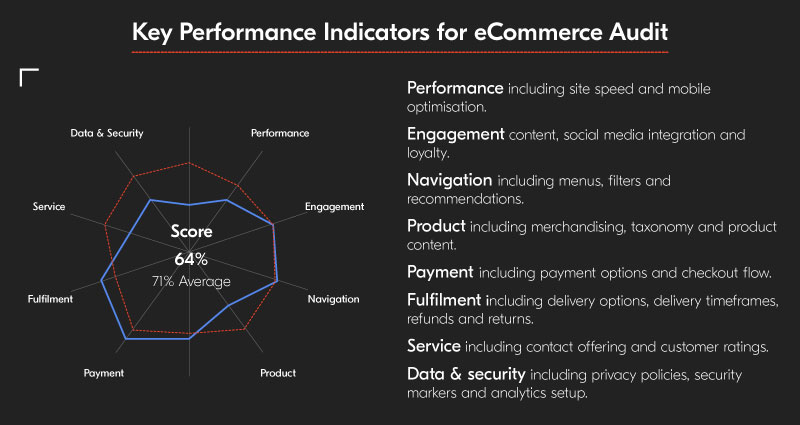
5. Is your Customer even Human?
Do you know that bots represent 50% of all the website traffic?
Do you also know that 30% of this 50% are bad bots?
These bad boys are the single-handedly the most significant contributors to eCommerce website frauds.
Everyone wants more traffic for their ecommerce site. However, it is necessary to ensure that all this traffic is legitimate and comes from a verified buyer. What you might suppose as legitimate traffic on your website could actually be malicious bots deployed by hackers and even your competitors to scrape your product prices and even steal your entire customer data, vendor data and product catalogs, that too within a matter of a few seconds.
For protecting your business against the threats of bad bots creeping into your website, you can employ a series of effective steps,
STEP 1: Detecting and Analyzing legitimate bot traffic is the first step. Bot detection platforms should be able to make out human traffic from non-human traffic. Non-human traffic patterns could be detected by employing logical puzzles and security questions on pages that involve cash flow.
STEP 2: Once you are finished implementing STEP 1, and bot traffic have been identified, the next step involves classifying the type of traffic. Bot traffic could either be from a known source – like that of search engine bots which should be allowed to pass through, and the other could be from a source malicious source, whose intent may not be clear – this shouldn’t be allowed to pass through.
STEP 3: The third and final step involves controlling the malicious bot traffic, which would depend on the intent of the bot. For example,
- If the bot is eyeing for vulnerabilities or trying to commit frauds like shopping cart stuffing, the software should deny access and return a false 404 “page not found” to the bot.
- For a DoS attack (denial of service), your bot mitigation and management solution should simply divert the traffic.
Fortunately, there are also some pretty effective bot detection platforms that you could leverage at a reasonable price for your eCommerce site, namely,
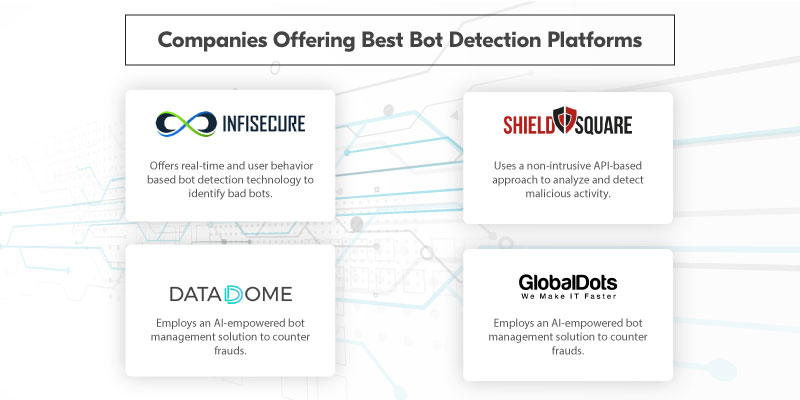
- Infisecure
InfiSecure offers real-time and user behavior based bot detection technology to identify bad bots. Their tools block web scraping bots in real time before they access your ecommerce website, thus preventing customers from fraudulent orders, data theft, price scraping, and variation tracking. - ShieldSquare
ShieldSquare utilizes a non-intrusive API-based approach to analyses and detects malicious activity on your ecommerce site, thus blocking bots in real-time without impacting the real users already browsing through your product catalog. - Data DomeBeing employed by some of the significant fortune 500 companies, Data Dome employs an AI-empowered bot management solution to counter frauds like user data theft, price scraping, etc.
- Global Dots
Global Dots is an extraordinarily efficient and effective platform to ensure security from bad bots. They use Behavioral Fingerprinting to analyze dynamic profiles of real customers to identify click frauds, content and price scraping.
Concluding View
Many pillars go into holding-up the dome of eCommerce security.
Data privacy being a major concern for every internet-based enterprise right now, it is extremely important, now more than ever to safeguard customer’s data to maintain the dwindling trust with eCommerce-based companies. With the revelation of Cambridge Analytica Scandal consumers have become unsure of commerce over the internet.
Whether you are just starting out, or have a small business in a place or a major enterprise – Doesn’t matter. These measures need to function like clockwork to ensure impeccable security for your website. One would also need to keep yourself and your team updated with the latest advancements in Cybersecurity.
Stringent security measures must be put in place to protect your company from threats, or risk jeopardizing revenue and customer trust.
After all, It is a tricky domain to be in, but,
The fruits of your labor will bear the fruits of your success.

